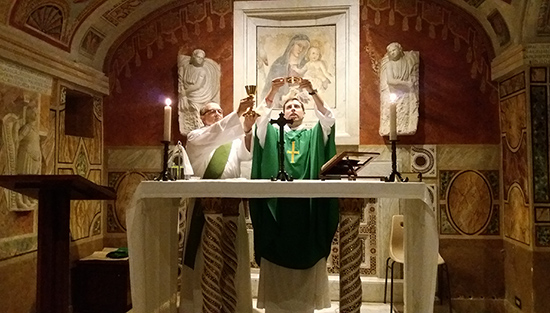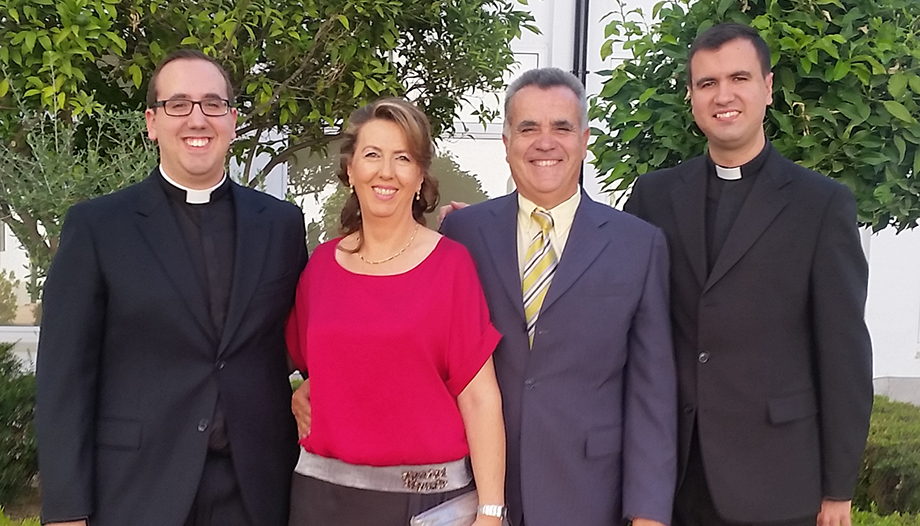María Luisa, Manuel, María José, Antonio, Julia... are those mothers and fathers who have seen how God became body and blood through the words pronounced by their children at the Consecration of the Blessed Sacrament. Holy Mass. Normal and diverse families, from rural and urban areas, with very different histories, with more or fewer children, with more or less ecclesial life... But united by the call to which their children have responded and in which they participate.
United at the altar
Manuel and María José have two sons, one of whom, Antonio Jesús, is a priest at the diocese of Cádiz and Ceuta. In his case, there is a peculiarity: Manuel is a permanent deacon, he shares part of the ministry with his son, something that he lives with great joy.
His vocation story is linked to a date: that June 24 when "after the Eucharist attended by the whole family, we were presented by our parish priest to our bishop, Bishop Ceballos, to ask for Antonio Jesús to enter the seminary and for me to be admitted to the diaconate".
Manuel and Antonio Jesús meet as father and son physically, but also spiritually, especially in those celebrations in which the permanent deacon assists the priest.
"The day of his First Mass," recalls Manuel, "was a moment full of meaning and feelings. As a deacon, I asked for his blessing before reading the Gospel, as established by liturgical norms: 'Father, bless me,' to my son. A moment that I will never forget and that every time we celebrate the Eucharist is repeated and acquires the same value".
When God asks for the 100% of children
The Navarro Carmona family, from Cordoba, has two sons, both of whom are diocesan priests. The entry into the seminary of Antonio, the eldest, did not catch them by surprise: "We saw his process and we saw him eager to advance on his way; and the road was not easy, we would say it was very hard. However, he saw the positive side, he reaffirmed himself and his vocation grew in the face of setbacks".
Juan Carlos' decision, however, took a little longer: "We thought he could do something else. We offered him multiple options. I remember," says his mother, Julia, "that we mentioned the vocation of a doctor, healing, saving lives... when we finished talking, he said, 'Do you want me to do that career? I'll do it. Then I will continue with the one I like: I want to devote myself to healing souls and saving them.
We were thrilled to answer her: "Your vocation is strong, go ahead. Her husband, Antonio, emphasizes that the call of their second son seemed to him, in fact, "too much for our family".
In spite of everything, they did not violently oppose the call of their children: "We believe in freedom and the right to choose the life of their children. We do not agree with any imposition, we parents do not have the right to deny God's decision".
Perhaps because of this commitment to the freedom and personal responsibility of young people, when asked what to say to those who oppose their children entering the seminary, Antonio and Julia are clear: "Our advice is to listen to your children".
With a promising future as an architect, Antonio Jesús' entry into the seminary was accompanied by a lot of misunderstandings. As his father recalls, "in the family there were certain comments, they asked us why we let him be in the seminary with what he was worth... after he became a priest, most of the family is happy. In his school, a classmate, his teacher, told me that he regretted that we let him go to the seminary with the academic value he had".
Normal reactions in those who do not share or understand the transcendence of the call, and to which these parents responded with a clear analogy: "How many parents, while disagreeing with the choice made by their children, defend them by saying, 'if he is happy, that is what is important'. Well, we can respond in the same way: Not only is he happy, but with his dedication and witness, he can make many people happy".
There are also more tender misunderstandings, recalls the couple based in Cadiz, such as the reaction of the lady who took care of him since he was a child while his parents worked. When he told her of his decision to enter the Seminary because he felt the call, I asked him, "Antonio, my beautiful one, but tell me, who is that calling you?
An army of prayers
In a letter addressed to the mothers of priests when he was Prefect of the Congregation for the Clergy, Cardinal Mauro Picenza, pointed out that "Every mother of a priest is mysteriously 'daughter of her son'. Towards him she can also exercise a new "motherhood", in the discreet, but most effective and invaluable, closeness of prayer and in the offering of her own existence for the ministry of her son. They are a true "army" that, from earth, raises prayers and offerings to Heaven and, even more numerous, from Heaven intercedes so that every grace may be poured out on the life of the sacred shepherds". Words that could well be applied to the group of mothers of priests who, every month in Madrid, meet to pray for priestly vocations.
An initiative of Maria Luisa Bermejo, which was born as a result of the ordination of her son Yago, of the Prelature of Opus Dei. At that time, Maria Luisa got in touch with other mothers of priests and started a prayer group for priestly vocations: "I spoke with a friend of mine who has a son who is a diocesan priest. Together we thought that we could do 'something more' for priests and the idea came up to get together one day to pray the Rosary for priestly vocations. We shared this idea with some diocesan seminarians who put us in touch with their mothers and things began", When the meetings were filled with new members.
"We spoke with a priest who suggested that we meet in a church so that we could pray better. Then, the rector of the Church of the Holy Spirit in Madrid, D. Javier Cremades, gave us everything he could. Not only did he allow us to go once a month to pray the Rosary, but he also began to say Mass for us and lead us in prayer.
That small group of mothers of priests grew little by little: "We became almost 70 people," recalls Maria Luisa, who points out that "now there are fewer of us, but we continue with this meeting. Every month a son of one of the priests comes to say Mass for us and leads us in prayer. Not only do we pray for the priests, but we have also created an impressive network of friendship among us.
These mothers of priests decided to name their prayers: "we decided to make a kind of 'invisible prayer friend'," says Maria Luisa, "we wrote down the names of the priests and their mothers on slips of paper, each one took one or two slips - it could not be her son - and promised to pray for these priests every day. I have two of them, very nice," she concludes.

These fathers and mothers pray for their children, with "the gratitude that their liturgical prayer is a 'two-voice' prayer," as Manuel points out, but they also pray for those who find it difficult in their environment to respond to God's call, for their fidelity, for their perseverance.
Fears and joys
In a society in which the figure of the priest is, more than ever, in the spotlight, these parents share the fears of those who have a child in public office. As Julia points out, "they are always in the spotlight: their decisions, actions and deeds are scrutinized with a magnifying glass" and there is always the fear of a misinterpretation, or even an unfair public judgment... but "the joys are immense and in abundance because these children are very enjoyable. We know that they are there at all times supporting us with their prayers and their presence.
Maria José and Manuel express themselves in a very similar way when they point out that "in today's society, just by saying that you are a believer, you are sure to be criticized, scorned..... The more so when your son not only manifests that he is a believer, but with his life and way of dressing he proclaims that he is a priest. It is not strange to observe looks and comments as he passes by, but it must also be said that you observe that other people approach him and ask him for confession, advice, blessing...".
But that same manifestation brings with it many anecdotes of "chance encounters" with the Church, such as the time when "on one of his trips from Madrid - where he was studying Moral Theology - to Cadiz, the train stopped in the middle of the countryside and some passengers came to him asking "father, pray for us to get out of this situation".








